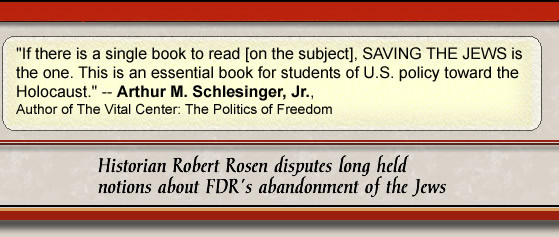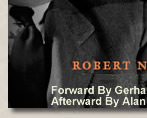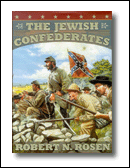




|
Reviews |
|
|
|
|
|
|
Why I Wrote The Book |
|
|
Excerpts |
|
|
Table Of Contents |
|
|
Auschwitz |
|
|
SS St. Louis |
|
|
Timeline |
|
|
A Survivor Speaks Out |
|
|
Carter Center Speech |
|
|
Justice At Nuremberg |
|
|
Purchase |
|
|
Related Links |
| The Jewish Confederates | |||||
|
Rosen finds that although many members of the established, prominent Jewish communities of Charleston, Richmond, and Savannah volunteered for battle, the majority of Jewish Confederates were recent immigrants. He describes the communities they established throughout the South and explains their reasons for supporting the cause of Southern independence. This chronicle relates the experiences of officers, enlisted men, businessmen, politicians, nurses, rabbis, and doctors. He recounts the careers of such important Jewish Confederates as Judah P. Benjamin, a member of Jefferson Davis’s cabinet; Col. Abraham C. Myers, quartermaster general of the Confederacy; Maj. Adolph Proskauer of the 125th Alabama; Maj. Alexander Hart of the Louisiana 5th; and Phoebe Levy Pember, the matron of Richmond ’s Chimborazo Hospital. He narrates the adventures and careers of Jewish officers and profiles the many "Jewish Johnny Rebs" who fought in infantry, cavalry, and artillery units in every major campaign. |
|||||
Reviews |
|||||
"An eye-opening, myth-shattering, stereotype-breaking work of
originality, elegance, and wisdom. A must-read for Civil War
buffs, Jewish history fans, and all Americans interested in
learning—and you will learn much—about Jewish southerners
who placed loyalty to their adopted states above the moral
teachings of their tradition (at least as we now interpret
them). You may not agree with these Jewish Confederates, but
you will surely understand them better." "Apart from a few prominent individuals such as Judah P. Benjamin
and Phoebe Yates Pember, Jewish Confederates have been virtually
invisible in the massive body of published work on the Civil
War. Robert N. Rosen's impressive study illuminates the world
of southern Jews and their role in the Confederacy's bid for
independence. It is a major contribution to Confederate studies,
and to the broader literature on the Civil War." "Perhaps no identifiable group of Southerners represented a greater paradox than the Jewish community spread all the way from Richmond to New Orleans. In The Jewish Confederates Robert N. Rosen opens a window on the unlikely story of a people apart, with their own religion and cultural customs, functioning within a Southern community that regarded itself as separate and distinct from other Americans. Through the lives of people as diverse as the Confederate statesman Judah Benjamin and the Louisiana teenager Clara Solomon, Rosen reveals the surprising tolerance in the South for this one minority, and the sacrifices they made to prove themselves full citizens of the supposedly xenophobic Southern republic."—William C. Davis "In this fascinating book Robert N. Rosen illuminates a long-neglected dimension of Confederate history, and, in so doing, makes an important contribution to the debate over the depth of southern white unity and Confederate loyalty. Meticulously researched, The Jewish Confederates makes clear that across the social and economic spectrum Jewish southerners overwhelmingly supported the Confederacy. With fascinating detail about well-known and little-known men and women, Rosen demonstrates that on both the battlefield and the homefront Jewish Confederates proved their loyalty, a loyalty they maintained after 1865 in their embrace of the Lost Cause. All who want to understand the nineteenth-century South should read this book."—William J. Cooper, Jr. "The Jewish Confederates is
the story of a people defining themselves. Robert
Rosen has a wonderful capacity to describe
people and their character in capsule. He's given us an important
book on a very significant topic—felicitously written
and festooned with photographs." "Robert Rosen's exceptional coverage of southern Jewry during the Civil War and Reconstruction eras stand as a testament to depth, breadth, and length. Jews are actors in the drama unfolding before them as well as the victims of forces beyond their control. Rosen weaves a captivating tale of allegiance, sacrifice, and Jews' ethnic identity and minority status in the South."—Mark I. Greenberg "Robert N. Rosen has continued in an admirable way his work on assembling information that is necessary to developing a realistic view of the lives of Jews in the South. Thanks to him, we can now take another step in answering the basic questions of why did Jews feel comfortable in the nineteenth-century South, and why was the South so accepting of Jews?"—Elliott Ashkenazi "This exhaustive study sheds light on a little-remarked curiosity of the Civil War's history: The Lost Cause claimed a great many Jewish partisans, and a regime dedicated to the defense of human slavery proved remarkably resistant to antisemitism."—The Washington Post "This groundbreaking study is liberally illustrated with photographs and maps, and is written clearly and energetically as a trade book, despite its academic stamp and thoroughness."—Publishers Weekly "Comprehensive and readerly"—New York Times Book Review "Larger public and academic libraries should consider this readable
book, as should all libraries with strong Judaic or military
collections." |
 In his latest study of the Civil War, Robert N. Rosen introduces readers
to the community of Southern Jews of the 1860s, heretofore
lost to historians and the general public. With the exception
of Judah P. Benjamin, Jewish Confederates are largely unknown
even to specialists of American Jewish history and Civil War
history. Rosen reveals the remarkable breadth of Southern Jewry’s
participation in the war and strength of Jewish commitment
to the Confederate cause. Intrigued by the apparent irony of
their story, Rosen weaves a surprisingly complex chronicle
that dispels common misconceptions about the Confederacy, its
leadership and soldiers, and its Jewish population.
In his latest study of the Civil War, Robert N. Rosen introduces readers
to the community of Southern Jews of the 1860s, heretofore
lost to historians and the general public. With the exception
of Judah P. Benjamin, Jewish Confederates are largely unknown
even to specialists of American Jewish history and Civil War
history. Rosen reveals the remarkable breadth of Southern Jewry’s
participation in the war and strength of Jewish commitment
to the Confederate cause. Intrigued by the apparent irony of
their story, Rosen weaves a surprisingly complex chronicle
that dispels common misconceptions about the Confederacy, its
leadership and soldiers, and its Jewish population.